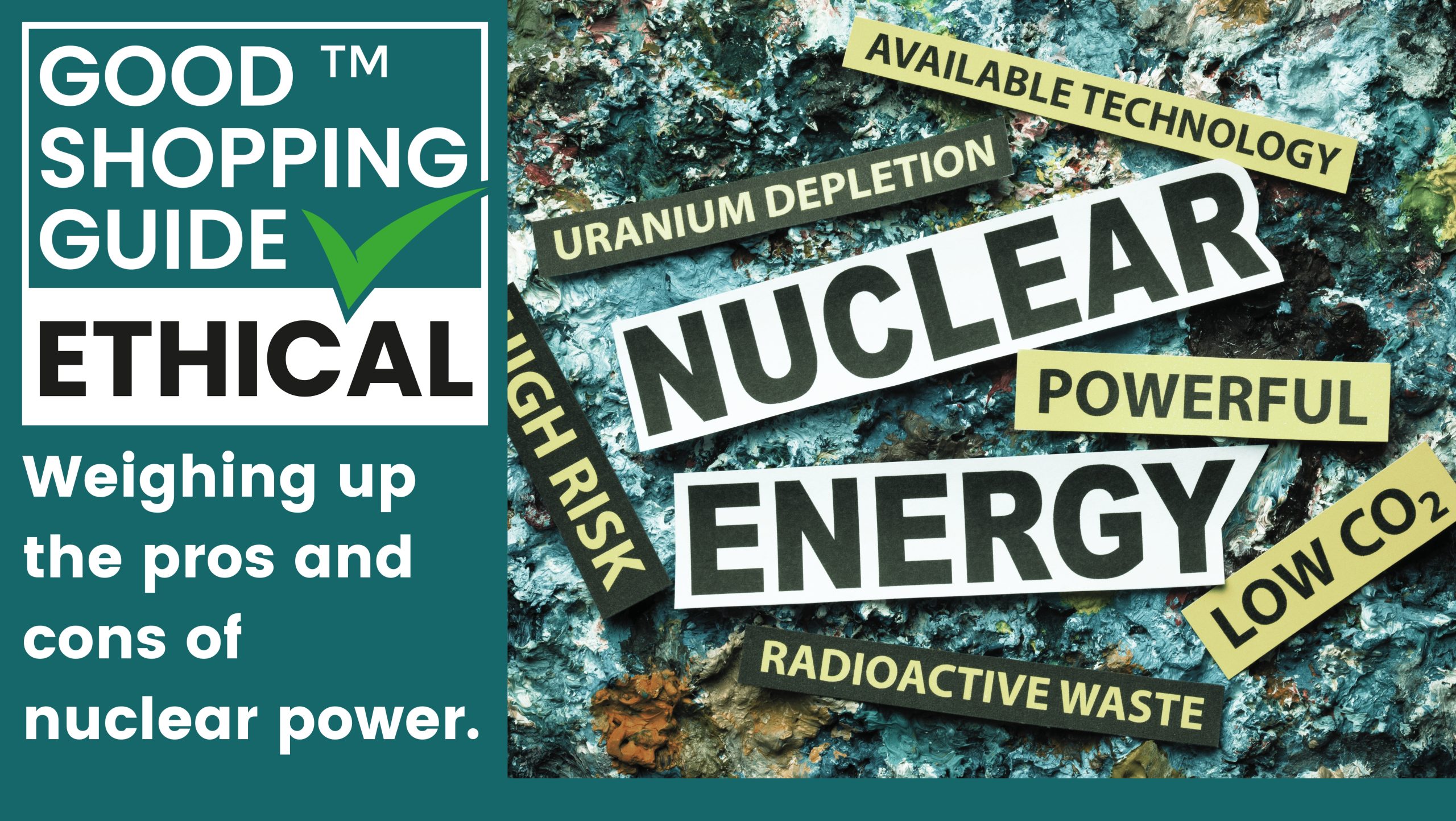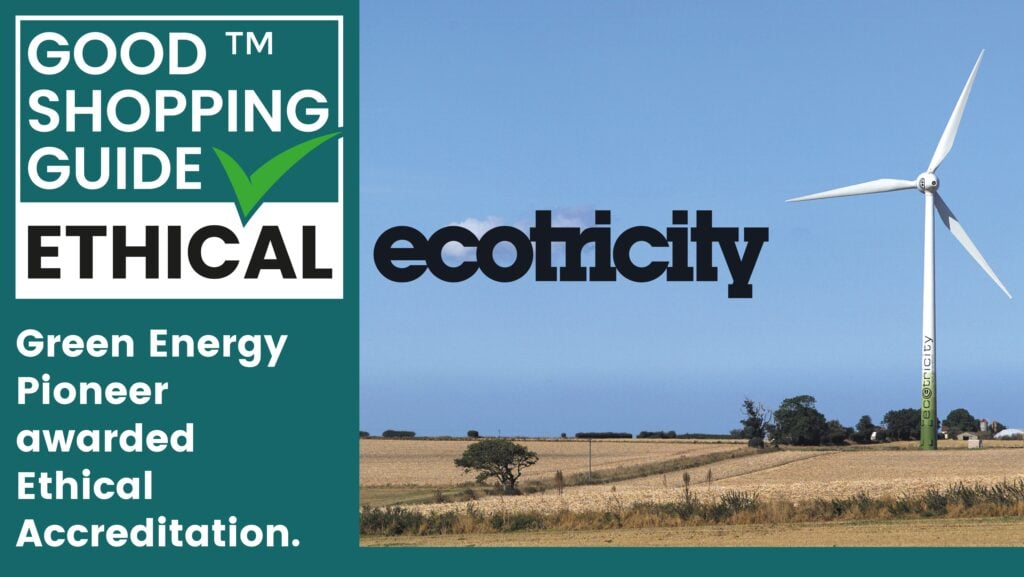Nuclear Power: A Force for Good?

In any context, the word ‘nuclear’ doesn’t exactly conjure up images of lush green pastures or thriving wildlife. Yet scientific research is showing that its energy may be a key part of slowing the damaging effects of climate change.
Our Criteria
Up until very recently, our research criteria at The GOOD Shopping Guide has mirrored that of environmental organisations such as Greenpeace. We have marked down brands and companies for being involved in the design, construction or operation of nuclear power stations. This was the result of looking at issues such as nuclear waste and faith in renewable energy sources such as wind and solar.
However, eagle-eyed readers will have noticed that our criteria has changed, and our latest ratings along with it. We have made the decision to begin phasing out our ‘Nuclear Power’ criteria across all sectors. This move is the result of a full review of current research by our research team.
There are many complicated problems attached to nuclear energy and a strong stance on whether it is or isn’t environmentally friendly is rare amongst the scientific community. What is becoming more and more evident however, is that we must approach nuclear energy from a contextualised and realistic stance, not from a realm of ideals where nuclear energy would of course be rendered unnecessary.
Criticisms of Nuclear
Nuclear is not a perfect solution. But many of its criticisms have been disproportionately construed or sensationalised in the media. From cost and waste to tragedy, nuclear energy’s impact spans major environmental and humanitarian themes.
It’s impossible to talk about the drawbacks of nuclear power without addressing the tragic disasters that have occurred at nuclear power plants in modern history. Beyond the loss of life and long-lasting consequences on survivors and the area itself, nuclear disasters have tainted the public opinion with fear. However, what’s rarely acknowledged when discussing the resulting risk that nuclear power plants pose is that all disasters have been the result of deliberate ignorance of procedure. Furthermore, the death toll associated with nuclear energy is reportedly 99.8% lower than that of coal, and 99.7% lower than oil’s. These numbers are simply less visible in the public eye as they are the result of accumulative, long-term factors such as air pollution.
One genuine criticism of nuclear power is its cost. It is five times more expensive than wind or solar which will drive up energy prices as a result. In the midst of a cost of living crisis, this will disproportionately impact people already experiencing economic precarity.
Another issue for the future of nuclear power will depend on rising sea levels. Power plants must be located by lakes or the sea, but as sea levels rise, this could threaten the expensive and complex maintenance of these plants.
The subject of nuclear waste is one of the main concerns when it comes to long-term environmental impact. Nuclear waste can take thousands of years to decay meaning it remains radioactive for millennia after the energy is extracted. The vast majority of nuclear power plants around the world use deep geological disposal to manage waste as safely as possible. Known as a ‘multi-barrier’ concept, this process relies on the waste packaging, engineered repositories and natural geology to prevent any future access to the material. This waste is buried between 250m and 5000m underground and then filled in with cement or clay. All nuclear waste ever produced would only fill a football stadium by about six foot. Nuclear actually produces less waste than coal, solar and wind power, that is to say 0.03kg compared to 89kg for coal.
Nuclear versus Fossil Fuels
As detailed above, fossil fuels generate more waste and more bodily harm than nuclear power. As well as this, they account for about 90% of global carbon dioxide emissions, which is the key contributing factor to global warming. Given the threat this poses to human as well as all other life on our planet, we believe that limiting these emissions is crucial to the preservation of life as we know it. Marking down brands equally for involvement with fossil fuels or nuclear energy seems disproportionate to the environmental threats they individually pose.
Indeed, the only area in which there is a case to be made for fossil fuels over nuclear energy is cost. Nuclear power plants are more expensive to build and maintain. However, when faced with the choice between spending more money and cutting down on carbon emissions in order to help prevent irreversible climate change, the choice is an easy one. We are already experiencing just a few of the costs of inhabiting a warmer planet. Natural disasters and their associated emotional and economic costs are just the tip of the rapidly melting iceberg. One report states that climate change has already cost $3.6 trillion in damage since 2000. From this perspective, emissions-free energy options like nuclear are actually saving money in the long run.
Nuclear versus Renewables
It is important to note here that nuclear energy does still have a carbon footprint. What may be surprising to most people, though, is that this carbon footprint is actually less than those of solar and wind energy. These indirect emissions are the result of the construction and operation of their respective generation sites. These two renewables also take up more space than nuclear power plants.
And crucially, what makes nuclear energy truly indispensable in our current climate is its steady supply. For better or for worse, nuclear fills in the gaps left by the less predictable and controllable output from renewable sources which often depend on external factors such
as the weather. The real issue with this unreliable output is that we do not currently have the logistics or technology to efficiently store this energy, meaning it cannot be harvested at its peak and saved for later distribution during times of high demand. Nuclear, on the other hand, generates a consistent and stable energy supply, ensuring demand is always met so people aren’t going without electricity.
The Benefits of Nuclear
The question of balancing sustainability with logistics is a tricky one. Inconsistent energy output could have catastrophic knock-on effects. Ultimately, stable energy will always be prioritised by consumers and governing bodies. If we are going to optimise the speed of carbon emissions reduction then nuclear has to be part of the solution. This is partly because wind and sun renewables cannot always be relied upon to deliver the volume of power needed, and less carbon emissions occur when nuclear (rather than fossil fuels) fills in the gaps.
It comes down to whether we choose to source this necessary energy from fossil fuels or nuclear power. As nuclear is clearly the better option for the environment, we must recognise that in our ethical ratings.
Share
Related articles

Ecotricity Gets The Green Light
Renewable energy supplier Ecotricity awarded Ethical Accreditation from The GOOD Shopping Guide.

The Pure Option: Ethical Food Packaging Solutions
The Pure Option’s plant-based packaging offers compostable alternatives to plastic that protect people, animals, and the planet.

Who is The GOOD Shopping Guide Reader?
The GOOD Shopping Guide readers stay up-to-date on the best and worst brands for ethics.